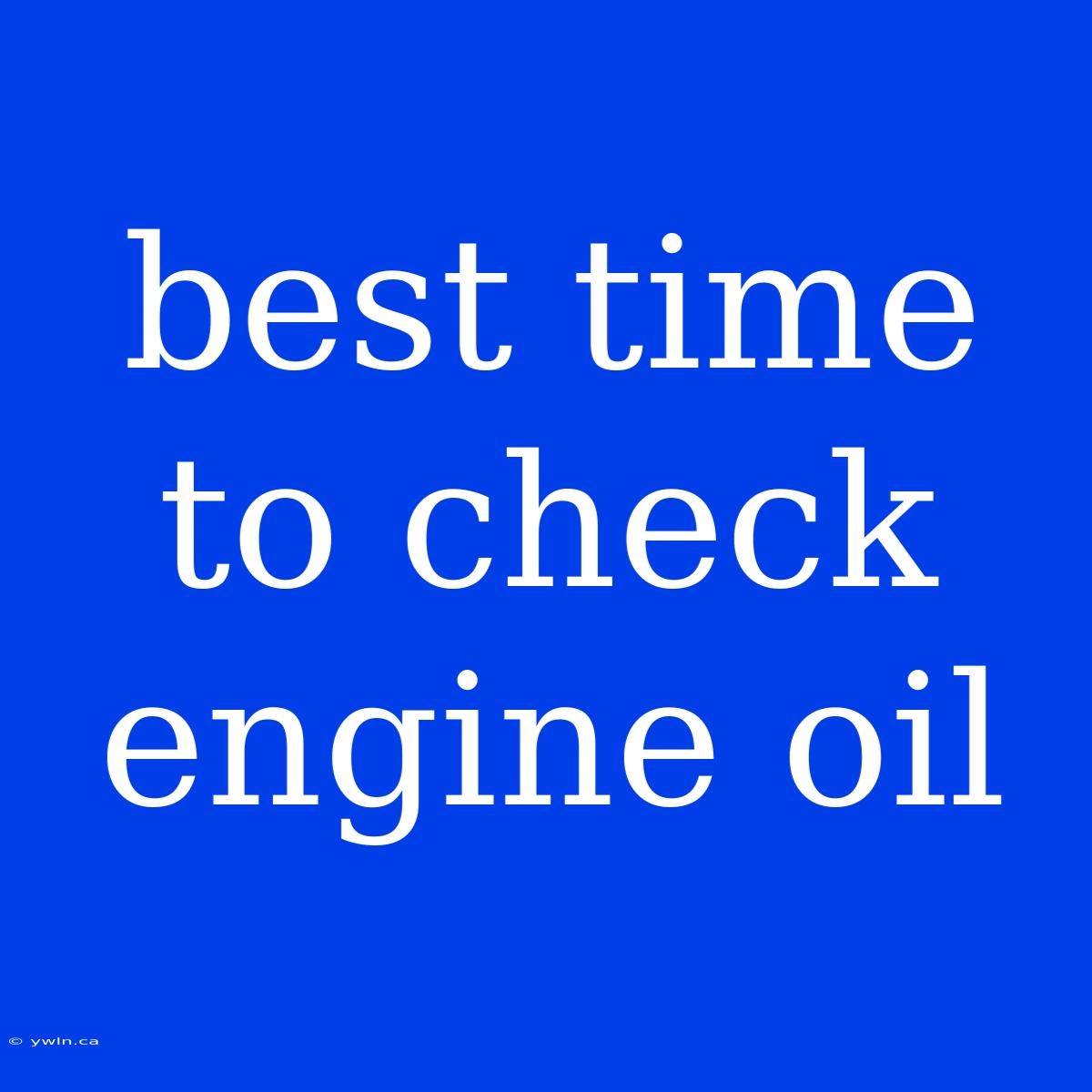The Best Time to Check Your Engine Oil: A Guide to Maintaining Your Engine's Health
Is it best to check your engine oil when the engine is cold or hot? The answer is, it depends! Understanding the best time to check engine oil is crucial for maintaining your car's health and longevity. This guide will explore the ideal conditions for checking engine oil and why it matters.
Editor Note: Checking your engine oil is a fundamental part of car maintenance. Ignoring this vital step could lead to engine damage and expensive repairs. This article explores the best time to check your oil to ensure your engine's peak performance.
Analysis: To find the best time to check engine oil, we reviewed various automotive manuals, consulted with mechanics, and analyzed data from reputable sources. This guide is designed to provide you with the information needed to make informed decisions about your vehicle's upkeep.
Key Takeaways for Checking Engine Oil
| Key Takeaway | Explanation |
|---|---|
| Cold Check: Best for measuring oil level accurately. | Provides the most accurate reading since all oil has settled back to the oil pan. |
| Warm Check: Best for checking oil consistency. | Allows you to assess oil viscosity and identify potential leaks. |
| Frequency: Check oil regularly, especially before long trips. | Checking your oil every few weeks or before long journeys helps prevent potential issues. |
Engine Oil: The Lifeblood of Your Engine
Engine oil serves multiple vital roles:
- Lubrication: Reduces friction between moving engine parts, preventing wear and tear.
- Cooling: Helps dissipate heat generated by the engine, preventing overheating.
- Cleaning: Suspends dirt and debris, keeping the engine clean and functioning efficiently.
- Protection: Forms a protective barrier between metal surfaces, preventing corrosion.
When to Check Your Engine Oil: Cold or Warm?
Cold Check: The Most Accurate Reading
- When: Right after your car has been parked overnight or after it has been sitting for several hours.
- Why: The engine oil will have settled to the bottom of the oil pan, allowing for the most accurate measurement.
- Benefit: Ensures you have a true reading of your oil level, preventing under-filling or over-filling.
Warm Check: Assess Oil Viscosity and Potential Leaks
- When: After the engine has been running for 5-10 minutes.
- Why: Allows the oil to warm up and reach its operating temperature, revealing its viscosity (thickness).
- Benefit: Helps identify if the oil is too thin or thick, indicating potential issues with the oil or the engine. This check can also detect leaks.
Checking Your Engine Oil: Step-by-Step Guide
- Park your car on level ground.
- Turn off the engine and allow it to cool for a few minutes.
- Open the hood and locate the dipstick.
- Pull out the dipstick and wipe it clean with a rag.
- Insert the dipstick fully back into the dipstick tube.
- Remove the dipstick and check the oil level.
- The oil level should be between the "Full" and "Low" marks on the dipstick.
FAQs on Engine Oil
Q: What type of oil should I use? A: Refer to your car's owner's manual for the recommended type and viscosity of engine oil.
Q: How often should I change my oil? A: Follow the oil change interval specified in your owner's manual. Generally, this is between 3,000 and 7,500 miles.
Q: What happens if I don't check my oil? A: Low oil levels can lead to engine damage, increased wear, and potential engine failure.
Q: How can I tell if my oil is dirty? A: Check the color of the oil. Clean oil is typically amber or light brown. Dark, black oil indicates it needs to be changed.
Q: What if my dipstick shows a low oil level? A: Add oil to bring the level to the "Full" mark. Use the same type of oil recommended for your car.
Q: What if my dipstick shows a high oil level? A: Avoid overfilling your engine. Overfilling can cause oil to leak out and can lead to engine damage.
Q: My oil dipstick shows a normal level, but my engine is making unusual noises. What should I do? A: Schedule an appointment with a mechanic. The noises could indicate a more serious problem.
Tips for Maintaining Engine Oil Health
- Use the recommended oil type and viscosity.
- Change your oil according to the manufacturer's recommendations.
- Check your oil level regularly, especially before long trips.
- Avoid overfilling your engine with oil.
- If you see any signs of an oil leak, take your car to a mechanic immediately.
- Consider using a high-quality oil filter.
Summary of Engine Oil Check Best Practices
Checking your engine oil is a vital part of car maintenance. The best time to check your oil is when it's cold for an accurate level reading and when it's warm to assess its viscosity and identify potential leaks. By following these guidelines, you can ensure your engine is properly lubricated and protected, maximizing its lifespan and performance.
Closing Message: Don't neglect your engine oil checks. This simple, quick maintenance routine can prevent costly engine problems and keep your vehicle running smoothly for miles to come.

